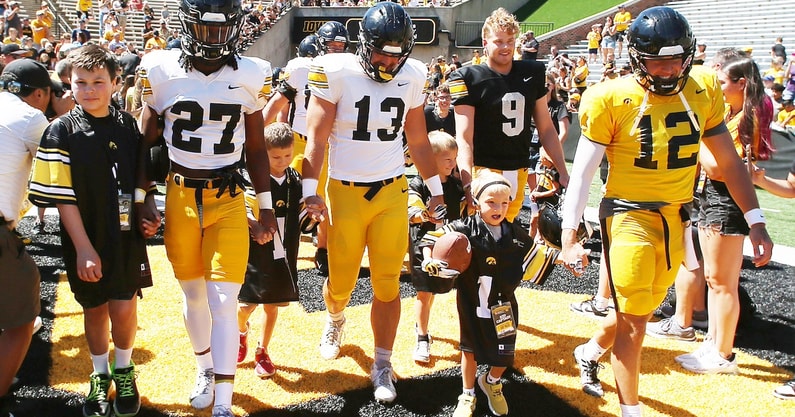Kirk Ferentz shares importance of Iowa’s kid captain tradition, interaction with families

For 15 years now, Iowa football has been part of a partnership that looms much larger than football, giving a handful of patients at the university’s Stead Family Children’s Hospital a chance to be part of the program via the “Kid Captain” initiative.
It’s something that head coach Kirk Ferentz is grateful to have been a part of each of the 15 years. From each of the dozen kids being designated as a captain for a given game on the schedule to small interactions with the kids and families during the year, he’s appreciative of the perspective it provides — and that he and his team can be part of some solace.
“Our opportunity to interact with them starts in August and myself and all the seniors, but they’re involved with them over in the locker room before kids day scrimmage or practice,” Ferentz said. “So it starts there and you get to meet ’em then. I think it’s a thrill for them to come out on the field and they swarm with the players. A lot of the coaches get involved in that. And then we’ll get to visit with them in the tunnel, out there outside the locker room before pregame. Typically they’re parked right outside our locker room, so you get a chance to go out and visit the family and take some pictures and wish ’em well.”
The connections to the children’s hospital also don’t stop with Ferentz himself, as he’s arguably the second fiddle to his wife, Mary. She has served on the hospital’s council from it’s formation in 2006 until at least 2018.
Top 10
- 1
Memphis shakes up CFP
Tigers upsets changes CFP picture
- 2
Charles Woodson
Michigan legend opines on Sherrone Moore
- 3
A Twisted Mess
Big 12 Championship scenarios
- 4Trending
Saban chirped
Big 12 comes after GOAT
- 5Hot
Underranked SEC
Lane Kiffin protests CFP rankings
At the podium, Ferentz sang his wife’s praises.
“And with children’s medicine, what I’ve learned is there’s a sense of community,” Ferentz said. “It’s obviously the doctors are in charge and they kind of set the direction, but you’ve got the nurses, the children’s specialists, the therapists that do all the work. The other part is any time you go over and if you visit anybody in the children’s hospital, there’s always a family member there. It’s like 98% there’s going to be a family member there. So it some ways it resembles or parallels sports in some ways. There’s a sense of community, there’s a sense of extension beyond the patient leaving. So I guess that’s just — and when I go to the dinners and stuff, I’m just to the side. I sit there and drink a beer or two and let Mary go up and give the speech and all that stuff. So I loved it. It was perfect. But you listen and learn. You learn about people.”
He continued and got choked up as he talked about the kids, specifically.
“The other aspect is just, kids have amazing,” Ferentz said, pausing as his voice caught with emotion, “kids tend to be pretty optimistic. They really do. That’s pretty cool to see.”